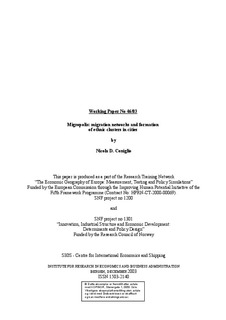| dc.contributor.author | Coniglio, Nicola D. | |
| dc.date.accessioned | 2006-06-28T06:53:07Z | |
| dc.date.available | 2006-06-28T06:53:07Z | |
| dc.date.issued | 2003-12 | |
| dc.identifier.issn | 1503-2140 | |
| dc.identifier.uri | http://hdl.handle.net/11250/165652 | |
| dc.description.abstract | In this paper we extend previous models of migration networks and ethnic cluster formation by considering migration as an ethnic-community wide phenomena where established migrants strategically provide support to newcomers. The incentive to provide support is associated with positive externalities which new waves of migrants might have on migrants already settled in the host location. Culturally-based tastes for particular goods and services generate an ethnic consumer demand and only individuals from the same ethnic community have the skills or the “insider’s information” required to provide these goods (protected market). If the ethnic population is large enough, an ethnic sector will emerge and eventually grow as the ethnic population expands further. According to the degree of preferences toward ethnic consumption, the mobility costs of the source locality population and congestion costs (hostility externalities) in the host location, alternative scenarios may arise. These scenarios provide a possible explanation of why different groups of migrants show different migration dynamics. | en |
| dc.format.extent | 680046 bytes | |
| dc.format.mimetype | application/pdf | |
| dc.language.iso | eng | en |
| dc.publisher | SNF | en |
| dc.relation.ispartofseries | Working paper | en |
| dc.relation.ispartofseries | 2003:46 | en |
| dc.subject | consumption externalities | en |
| dc.subject | immigration | en |
| dc.subject | ethnic cluster | en |
| dc.subject | ethnic goods | en |
| dc.title | Migropolis : migration networks and formation of ethnic clusters in cities | en |
| dc.type | Working paper | en |
